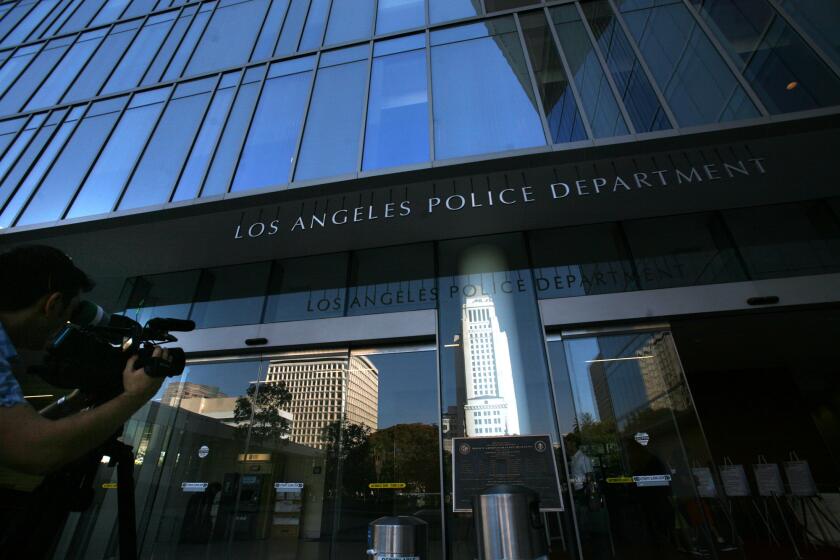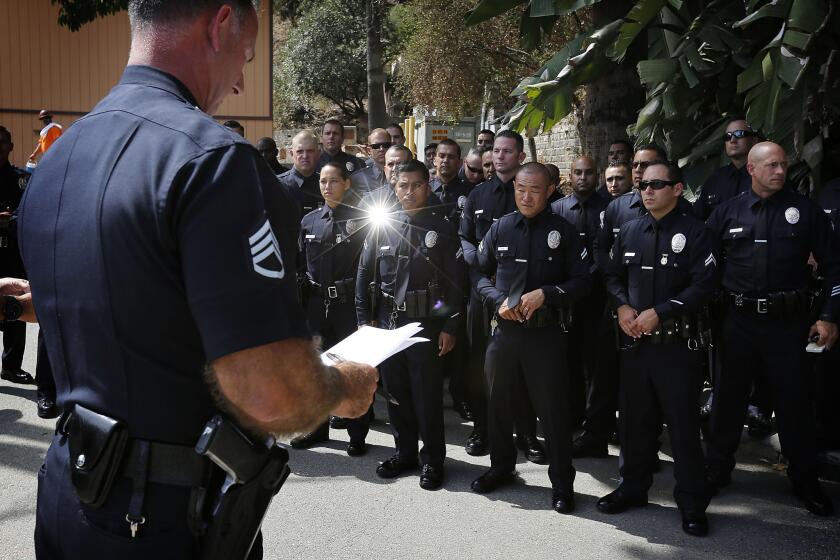Judge tosses case against three LAPD officers charged in gang labeling scandal

- Share via
Criminal charges were dismissed Tuesday against three Los Angeles police officers accused of falsely documenting people as gang members.
Following more than two weeks of testimony at a preliminary hearing, Los Angeles County Superior Court Judge Michael Pastor ruled that prosecutors did not have enough evidence to continue with the case against officers Rene Braga, Julio Garcia and Raul Uribe, according to the officers’ attorney and a transcript of Pastor’s remarks.
In reaching his decision, Pastor noted that the officers had been accused of misrepresenting evidence in a single case, “not a pattern” of offenses, as are three other LAPD officers who have been charged in another case. Pastor said he did not believe the officers had “the specific intent to make false statements” or “a fraudulent or deceitful purpose” when they noted in police records that people they encountered during a traffic stop had gang affiliations.
The charges were part of a broader scandal in which the six LAPD officers were accused of falsifying field interview cards that officers use to record and track information about suspects and others they encounter while on patrol. The allegations roiled the LAPD and illustrated how, despite decades of reform efforts, distrust toward the department in Black and Latino communities remains high.
Braga, Garcia and Uribe were each accused in October 2020 of writing on a field card that the person they had stopped “admitted to being a gang member, even though body-worn camera video showed the defendants either never asked the individuals about their gang membership, or the individuals denied gang membership if they were asked,” prosecutors alleged at the time.
An officer in the LAPD’s Metro Division alleges in a lawsuit that commanders have enforced a de facto quota system that rewarded officers who arrested a lot of alleged gang members.
The charges came several months after the three other LAPD officers were accused of fabricating such information in similar ways on multiple cards — with one officer accused of doing so dozens of times.
Pastor questioned a key claim by prosecutors that officers who reported people had “self-admitted” to being gang members were guilty of falsifying evidence if video recordings of the encounters did not capture the people clearly admitting so.
Pastor instead sided with the officers’ defense attorney, who argued at the hearing that the LAPD at the time had no clear definition of what it means for someone to have “self-admitted” their membership in a gang.
Caleb Mason, the officers’ attorney, said that several LAPD officials had testified during the proceedings that the department’s definition of “self-admitted” referred not only to someone making a verbal admission of gang affiliation, but also to instances where an individual’s behavior, clothing or tattoos made their gang affiliation clear.
After LAPD officers were charged with falsifying records, California’s attorney general has stopped law enforcement statewide from using LAPD gang member records.
Echoing Mason, Pastor said the officers “were encouraged by training officers and colleagues and supervisors to utilize their experience and their knowledge from training, and their expertise and their access to social media and research, to go beyond the limited nature of express verbal statements” in assessing people’s gang affiliations.
“And as far as this court is concerned, that’s what all three officers did in this particular case,” he said.
Instead of going “rogue,” the officers “were acting under the current state of affairs” within the LAPD, Pastor said, “and the dereliction, if there is one, does not lie with them” but “higher up in the command structure, perhaps to the highest levels.”
Mason said his clients were “thoroughly vindicated” by the judge’s ruling. Alex Bastian, a special advisor to Dist. Atty. George Gascón, said the prosecutor’s office “is reviewing the decision and weighing our options.”
Prosecutors have begun dismissing felony cases that relied on the work of LAPD officers charged with falsifying records by claiming without evidence people they stopped were gang members.
In a statement released late Tuesday, the LAPD said that while it “accepts the court decision,” it would continue its internal investigation into the misuse of field interview cards and officers would undergo “additional training to prevent the potential for any future occurrences.”
The department revised its policy on field cards last year to state explicitly that officers “shall not document opinions, including an opinion that the person is a member or affiliate of a gang, unless they indicate the specific and articulable facts upon which they base that conclusion.”
The board of directors of the Los Angeles Police Protective League, the union that represents rank-and-file officers, said the three officers “should be returned to active duty as quickly as possible to continue protecting our residents against the rise in violent crime plaguing Los Angeles.”
The ruling delivered a significant blow to prosecutors in the gang labeling scandal, which embarrassed one of the department’s most elite enforcement squads; led to internal allegations of officer quotas for identifying gang members; prompted the LAPD and state officials to halt the LAPD’s participation in CalGang, a statewide gang database that for years had been populated with gang information collected on LAPD field interview cards; and led to prosecutors dismissing felony cases that hinged on the testimony of the accused officers.
Critics of the LAPD who have long alleged that the department upends people’s lives by mislabeling them as gang members hailed the charges and the various steps taken in their wake as a step toward addressing a problem that had persisted for decades.
It remained unclear Tuesday whether Pastor’s ruling will have an effect on any of those decisions, or on the remaining criminal case against the three other charged officers, who have been accused of falsifying gang information on a larger scale.
Officers Braxton Shaw, Michael Coblentz and Nicolas Martinez were charged in a 59-count complaint in July 2020 — three months before Braga, Garcia and Uribe — with conspiracy to obstruct justice and multiple counts of filing a false police report and preparing false documentary evidence. They also were accused of claiming without evidence on field interview cards that people they stopped were gang members or associates.
Prosecutors alleged Shaw falsified 43 field interview cards, Coblentz falsified seven cards and Martinez falsified two cards. They alleged that videos recorded by cameras worn by the officers showed people who the officers said had admitted to being gang members had made no such admissions. In some cases, people had explicitly denied having gang affiliations.
The charges against Shaw, Coblentz and Martinez are pending, and a preliminary hearing in their case is set for March 24. Each has pleaded not guilty.
One of their attorneys, Greg Yacoubian, said Tuesday that he thought Pastor “got it right” when he suggested fault in the case may rest higher up in the LAPD with those responsible for training officers.
The use of field interview cards to identify gang members by officers in the LAPD’s Metropolitan Division first came under investigation in 2019, after a Van Nuys mother received a letter informing her that her son had been identified as a gang member — a claim she disputed. After a supervisor reviewed body-camera video from the encounter involving her son and found inaccuracies in the officer’s report, the department launched an investigation.
Mason said he hoped the three officers, who had been suspended pending their trial, would be allowed to return to duty soon.
“They got caught up in a prosecution that should not have been brought and they have been thoroughly vindicated by the court’s ruling today,” he said. “They want nothing more than to get back to serving the people of Los Angeles.”
Internal records from the L.A. County district attorney’s office show that prosecutors believe that at least 10 officers in total may have fabricated gang information on field cards, though charges were only ever brought against the six.
More to Read
Sign up for Essential California
The most important California stories and recommendations in your inbox every morning.
You may occasionally receive promotional content from the Los Angeles Times.

















